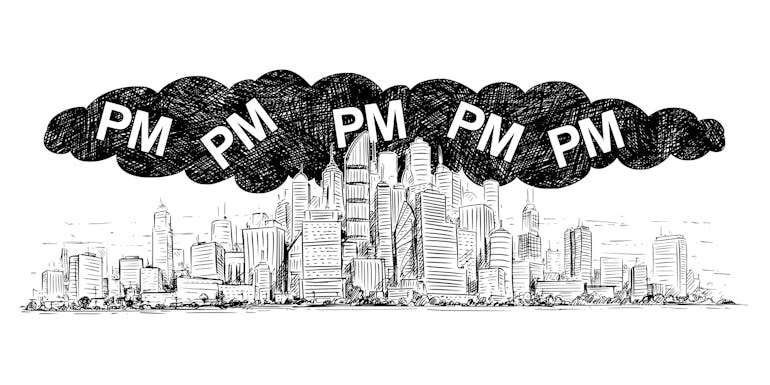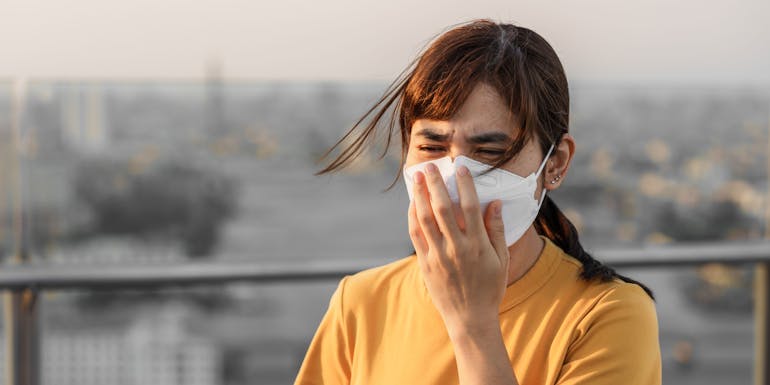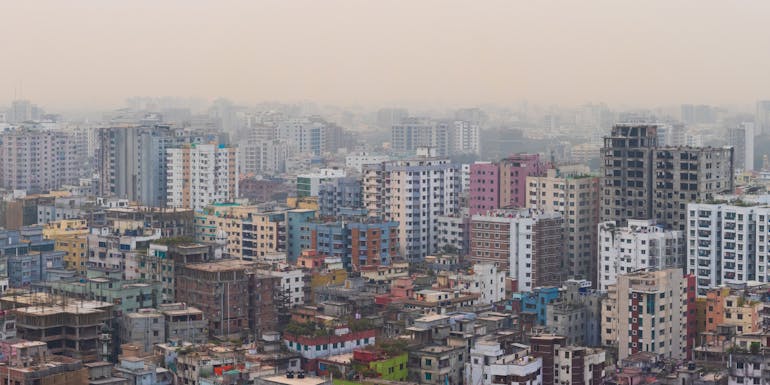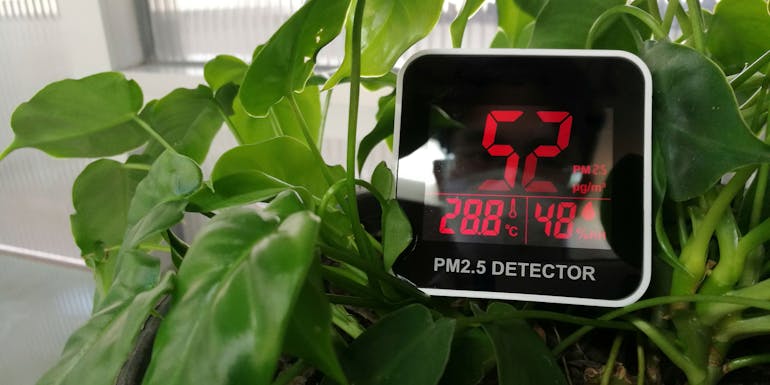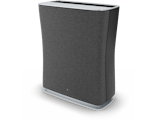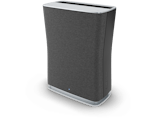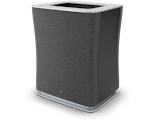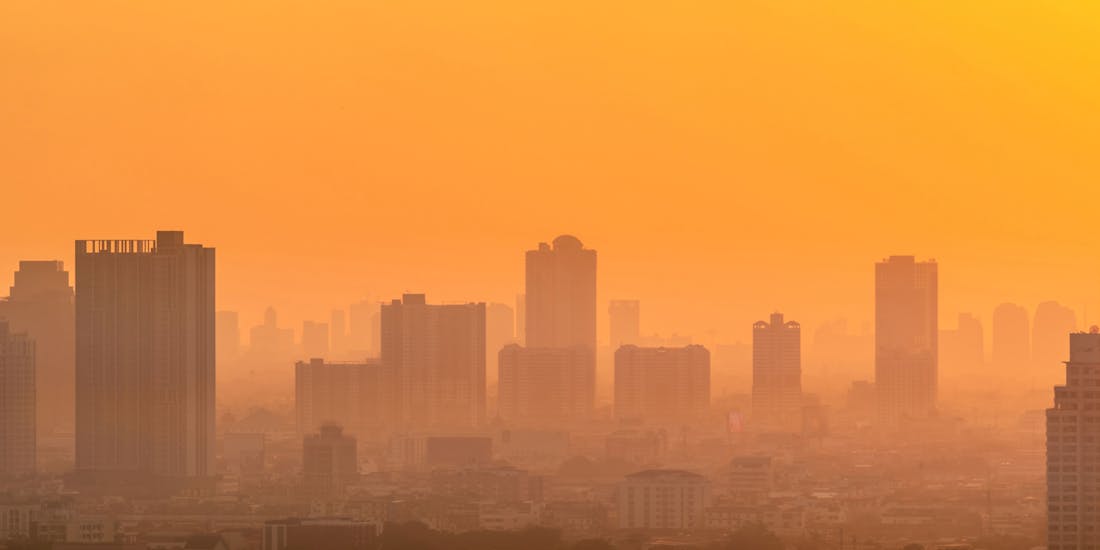
Nadine Walder, 17 April 2024
Purify the air
Particulate matter: everything you need to know about it
In the densely populated urban areas of our world, particulate matter is a serious threat that poses major challenges. Its effects extend beyond the environment and directly influence our well-being. In the long term, particulate matter can lead to a variety of health problems. To counteract air pollution, collective efforts from the private sector, politics and civil society are needed above all. We explain everything you need to know about particulate matter, how you can take action yourself and what you can do at home to ensure that you and your loved ones can breathe clean air.
Read on to find out:
- What is particulate matter?
- Particulate matter pollution and the potential health cosequences
- An international comparison of air pollution
- Global efforts to keep the air clean
- Improve air quality: What can be done?
What is particulate matter?
Particulate matter are very small particles that float around in the air. You can barely see them with the naked eye because they are so tiny. They are produced, for example, by car exhausts, construction work, smoke from combustion processes or cooking.
Particulate matter is a complex mixture consisting of primary and secondary particles. Primary particles are generated directly by combustion processes, mechanical abrasion from tyres and natural sources, while secondary particles are formed in the air from gaseous precursors (e.g. volatile organic compounds, sulphur dioxide or ammonia).
The size of the particles varies, but they are so tiny that they can penetrate deep into our airways, increasing their potentially harmful effects on our health.
Particulate matter pollution and the potential health consequences
Particulate matter can occur in different sizes. When talking about particulate matter, a basic distinction is made between PM2.5 particles and PM10 particles. These particles get their name from their diameter of less than 2.5 and 10 thousandths of a millimeter respectively. For comparison: a human hair is on average 0.05 to 0.08 mm thick, and a normal sheet of paper is 0.1 mm thick. PM2.5 particles are particularly dangerous as they can penetrate deep into the airways and lungs and even enter the bloodstream. In contrast, PM10 particles are more irritating and are less likely to penetrate deep into the lungs.
Prolonged exposure to particulate matter can lead to localised inflammation in the airways and cause serious health problems, including coughing, shortness of breath, bronchitis, asthma attacks, cardiovascular disease and even lung cancer. Due to these potentially serious consequences for our well-being and health, it is important that politicians, the private sector and civil society take active steps to combat air pollution.
Particulate matter is also a problem for allergy sufferers. Exposure to particulate matter can increase allergy symptoms, especially in the case of hay fever and asthma. One possible reason for this could be that particulate matter attaches itself to pollen and makes it more allergenic. According to the Swiss Medical Forum (German website), it has been clear for some years that there is a link between air pollution, climate change and respiratory allergies.
An international comparison of air pollution
In its 2021 guidelines, the WHO recommends an annual limit of 5 µg/m³ for PM2.5 particles. Unfortunately, many cities around the world exceed these values many times over. Just ten countries or territories remained below this threshold in 2023.
According to the latest figures from the World Air Quality Report 2023, cities such as New Delhi, Dhaka and Jakarta are among the cities with the highest levels of air pollution in the world and the highest number of annual deaths as a direct result. All but one of the countries in the top ten are in the Asian region. European countries, on the other hand, have improved their values almost without exception. Only in 6 out of 42 countries have the values worsened.
Global efforts to keep the air clean
Air pollution is a pressing problem that causes half a million premature deaths every year in the WHO European Region alone, mainly from diseases such as strokes, ischaemic heart disease, COPD (chronic obstructive pulmonary disease) and lung cancer. The WHO calls for increased joint efforts to keep the air clean and emphasises the need for partnerships, investment and shared responsibility.
The main sources of air pollution are diverse and range from emissions from the energy sector to transport emissions, industrial processes and activities such as cooking and heating. Far-reaching measures are required, which must be implemented not only at national but also at international level.
The Budapest Declaration, which was adopted at the Seventh Ministerial Conference on Environment and Health, emphasises the urgency and necessity of measures to tackle the health challenges associated with environmental pollution, biodiversity loss and climate change. It emphasises strengthening governance, investing in human resources and promoting knowledge and tools for action.
Policymakers have various measures and instruments at their disposal to combat air pollution. The WHO's Global Air Quality Guidelines provide evidence-based recommendations on air quality and serve as a guide for policymakers to set standards and targets to keep the air clean. The mobilisation of deliberate cross-sectoral action and increased cross-border cooperation are crucial to reduce air pollution and protect health.
Efforts to combat particulate matter require cooperation between politicians, the private sector and civil society. You too can take action to help improve local air quality. There are also things you can do to improve the air quality in your home and breathe cleaner air there.
Improve air quality: What can be done?
In order to reduce particulate matter pollution, private individuals can take a number of measures to reduce their personal contribution to air pollution and protect their health.
- Find out about the level of air pollution where you live and monitor the air quality in your home. Air quality can be measured using special measuring devices.
- Reduce your own contribution to particulate pollution by using public transport or carpooling instead of driving your own car.
- If you can't or don't want to do without your own car, have it serviced regularly.
- Avoid burning agricultural and household waste.
- If possible, use renewable energy sources, such as photovoltaics on the roof, heat pumps that extract heat from their surroundings or pellet heating systems.
- Monitor your own energy consumption and use energy-efficient appliances and light bulbs.
- To improve the air quality in your home and breathe clean air, you can invest in a powerful air purifier. This can filter the smallest particles from the air and thus make a decisive contribution to reducing fine dust pollution in your flat or house.
Particulate matter is an invisible but serious threat to our health. By being aware of the sources and taking measures to reduce particulate pollution, we can protect our health. Using a powerful air purifier is an effective solution to improve the air quality in your home and create a healthy living environment.
Would you like to find out more about air purification? On our information page you will find useful tips and tricks as well as everything you need to know about indoor air purification.
If you have questions related to indoor room climate, please get in touch with us. Or subscribe to our newsletter to regularly get informed about current topics regarding indoor climate, experience reports or Stadler Form insights.
